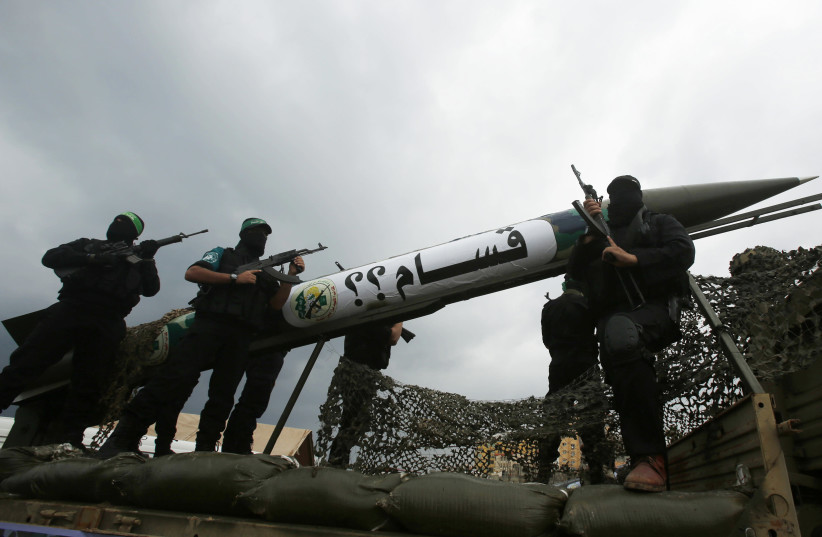The Erez crossing between Israel and the Gaza Strip will remain closed on Sunday due to the continued rocket fire from the Hamas-ruled enclave, the Coordinator of Government Activities in the Territories (COGAT) announced on Saturday.
“Following the rockets that were fired toward Israeli territory from the Gaza Strip last night, it was decided that crossing into Israel for Gaza merchants and workers through the Erez Crossing will not be permitted this upcoming Sunday,” the statement read, adding that “the reopening of the crossing will be decided in accordance with a security situational assessment.”
Late on Friday night, two rockets were fired from the northern Gaza Strip toward Israel near the community of Ein Hashlosha. One rocket fell in open territory causing no damage or injuries, while the other landed inside Gaza, reportedly seriously injuring a Palestinian and lightly wounding three others.
Several hours later, another rocket was fired and landed in open territory close to a town near the border fence. No incoming rocket siren was activated, though an alert was pushed from the Home Front Command mobile application for those nearby.
The rocket fire comes amid tensions surrounding the Temple Mount as dozens of Palestinians have been injured and hundreds arrested following violent clashes with Israel Police.

Temple Mount clashes rage on
On Friday morning following prayers at the holy site, rioters began throwing stones toward security forces who used a police drone to fire stun grenades as a riot control measure in response.
According to the Palestinian Red Crescent, 57 Palestinians were injured including one man who was seriously injured and evacuated to Jerusalem’s Hadassah Ein Kerem Medical Center.
While Palestinians say he was hit in the neck by police-fired sponge bullets, police said he fell over after throwing rocks at police. The hospital said that there was “no evidence” that the injury was from live ammunition.
Israeli officials believe that while Hamas is not interested in any conflict, their major concern is that the violence in Jerusalem might spiral and lead to other terror groups in the Strip launching rockets into Israel – therefore dragging the country into yet another war.
Not the first time
Last year, violence on the Temple Mount, coupled with the cancellation of Palestinian elections, caused Hamas to fire seven rockets toward Jerusalem, leading to 11 days of deadly conflict called Operation Guardian of the Walls by the IDF and Sword of Jerusalem (Saif al-Quds) by Hamas.
On Thursday, the Israeli Air Force struck targets in the Gaza Strip in response to earlier rocket fire launched toward southern Israel that damaged a parked car and a wall near a home in Sderot.
The rocket did not explode, but several people were treated for shock, including a 70-year-old man who was transferred to hospital. Six others were injured while seeking shelter, four of them transferred to hospital for medical treatment.
Sappers handled the rocket fragment found at the scene, along with Israel Fire and Rescue Services firefighting crews.
The Iron Dome missile defense system was not activated.
In response, the IDF said that fighter jets targeted a military post and a tunnel complex in the Hamas-run enclave “containing raw chemicals used for the manufacturing of rocket engines.”
The IDF said that the strike dealt “a significant blow” to the rocket production process in Gaza.
Terror groups determined to continue clashes
Hamas official Izzat al-Rishq said Thursday morning that the Israeli strikes on the Gaza Strip “will not affect the will and steadfastness of our people.”
Stressing the commitment of the Palestinian resistance to continue defending Jerusalem, Al-Aqsa and the other holy sites, he said that the “equations imposed by the battle of Saif al-Quds were irreversible.”
During the airstrikes, terrorists in the Strip fired anti-aircraft missiles, the second time in a row that such a system was used. On Tuesday, during retaliatory Israeli strikes on the coastal enclave, Hamas fired a Russian-made Strela (SA-7) shoulder-to-air missile.
The IDF said that the attempts to hit any aircraft, both on Tuesday and Thursday, had failed and no damage was caused.
Despite initial reports suggesting four rockets were fired toward Sderot during the overnight strikes, the IDF said only one rocket was actually launched, stating that all other instances of sirens sounding in southern Israel throughout the night were due to machine-gun fire from Gaza.
In one instance, machine-gun fire caused damage to a home in the Hof Ashkelon Regional Council. There were no injuries.
Another rocket landed within the Gaza Strip at around 5.30 a.m., the IDF said.
Is Israel ready for another wave of violence?
In a meeting on Thursday with Israeli political leaders representing towns near Gaza, Defense Minister Benny Gantz assured them that security forces were prepared for a variety of scenarios, and would take the necessary measures to maintain the security of Israeli citizens.
During a visit on Tuesday afternoon to the Judea and Samaria Border Police, Gantz warned that Israel would not allow continued rocket fire from the Hamas-run enclave.
“The IDF is ready with a wide range of means and targets – so that peace and stability will continue,” he said.
“If the incitement and rocket fire continues the terrorist organizations will be severely harmed, as will the people of Gaza, who are currently benefiting from the moves we have made to develop the economy and allow them to work in Israel,” he warned. “These are moves that we will expand if stability continues – or we can go backward, if the Hamas leaders decide to harm it.”
Jerusalem Post Staff contributed to this report.
